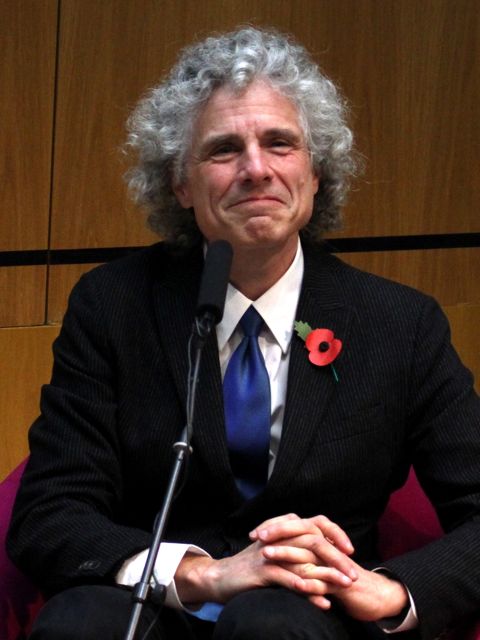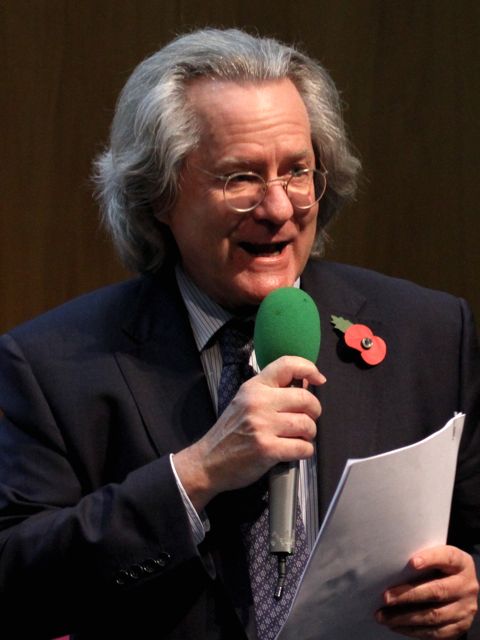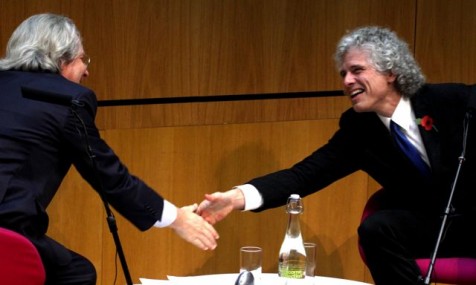I’m conscious the blog has a science-celeb Picture Posty feel of late; but remember: (a) there have been an unusual number of cool events in London the past couple of weeks, (b) you like this stuff :-P, (c) someone’s got to do it.

More importantly, you need to know tonight’s conversation with Anthony Grayling and Steven Pinker at the Wellcome Collection was quite excellent, and it’s well worth catching the BBC World Service broadcast of the event on Christmas Eve and again on Christmas Day: details here.

The Pinker canon of academic and popular science writing covers broad ground: from the ‘Stuff of Thought‘s analysis of language and the (amazingly dull sounding but actually very interesting) irregular verbs, through the controversial nature-nurture territory of the ‘Blank Slate
‘, to pontification on the (relative) demise of global violence in the recent ‘The Better Angels of Our Nature
‘.
Tonight, Grayling steered the Canadian psychologist through the whole smash in about 80 minutes, including a good twenty minutes or more of intelligent audience questions. The proceedings were introduced as part of the ‘Exchanges at the Frontier’ series by Wellcome’s lead on public programmes Ken Arnold, and Charlie Taylor for the BBC.
Watch out for the broadcast; but as usual here’s a few facts, quotes, stuff-that-I-remember-or-jotted-down, mindless ramblings, as a taster:
The first part of the conversation was about language. Discussing a generic mental model of how we use metaphor in day-to-day speech, Pinker used the example of ‘grasping an idea’, ‘getting across’ an idea, to ‘unpack’ an idea – asking us to take the underlying metaphor as a little marble in a box. The box here is language, we communicate by sending the box, we open the box, the marble inside is the meaning. (Re communication and meaning, also check out my post on James Gleick’s The Information re Claude Shannon, and follow your nose from there.)

On another tack, Pinker linked our tendency for profanity – swearing – to the emotional parts of our brain (rather than the rational/cognitive) and activation of the ancient mammalian ‘rage circuit’ – as likely to be triggered by stubbing our toe or sitting on a cat (in which case from the cat’s perspective). The cat yowls to startle an attacker; our evolutionary hangover induces a good old-fashioned “F***!” (In deference to the BBC he didn’t say it quite like that).
A round of audience questions on language: “Gentleman in the russet tee-shirt” (in the nicest possible way, Grayling is very good at this), and we’re on to subtlties of the mind. Pinker elaborates his Blank Slate quote “The conscious mind – the self or soul – is a spin doctor, not the commander-in-chief” with reference to how we lie to ourselves (we do), as a means of sounding more convincing when we lie to others: a kind of practice for consistency. (Pinker referred to Robert Triver’s on this theme, who’s views are expanded here in the Guardian.)
Answering a related audience question on the necessity of language for introspection (e.g. in babies with no language yet), Pinker referenced the ‘default network’: simply put, what your brain is doing when you’re not really thinking on anything in particular. This seems pretty key, that we can think unconsciously and experience concepts without language. And while I take Pinker’s point that children must have some non-language dependent cognitive ability to be able to adopt a language in the first place, I suspect there’s a lot we don’t know.
Moving to his latest focus – violence – Pinker contrasts our violent impulses (e.g. predation, rage) with a counter-tendency for self-control: the infrastructure for his latest book’s broader thesis of inner demons versus better angels. The ensuing discussion on murder, ideological violence and sadism (an acquired taste, like chili peppers) is probably best left for your Christmas Eve listening.
So what happens when the better angels pull ahead of the pesky demons?
Pinker says we get a general decline in violence. One that he can illustrate with statistics of murder rates, wars, attrocities – you name it – it’s declined; not necessarily in absolute terms, but on a pro-rata basis for a given population (in the book Pinker explains why this might be a sensible way of measuring things).
Graphs aside though, with all the turbulence in the world today (economic and otherwise), the thrust of the wind-up Q&A was around how permanent this new low-violence regime might be. Encouragingly – just what we’ll need at Christmas – Pinker suggests Greece won’t in fact be going to war with Germany anytime soon [despite everything], and, likewise, the USA and China will be cool (think: “they make all our stuff, we owe them too much”).
So. For the most part. We can. Relax.
(p.s. I asked my own question on how the observed virtuous developments in culture and human nature might somehow express (or have been expressed) in our biology, whether through genetics or epigenetics, and got a good answer from Pinker. They’re bound to broadcast that bit, but if they don’t I’ll expand in a future post). Update: [they did here]